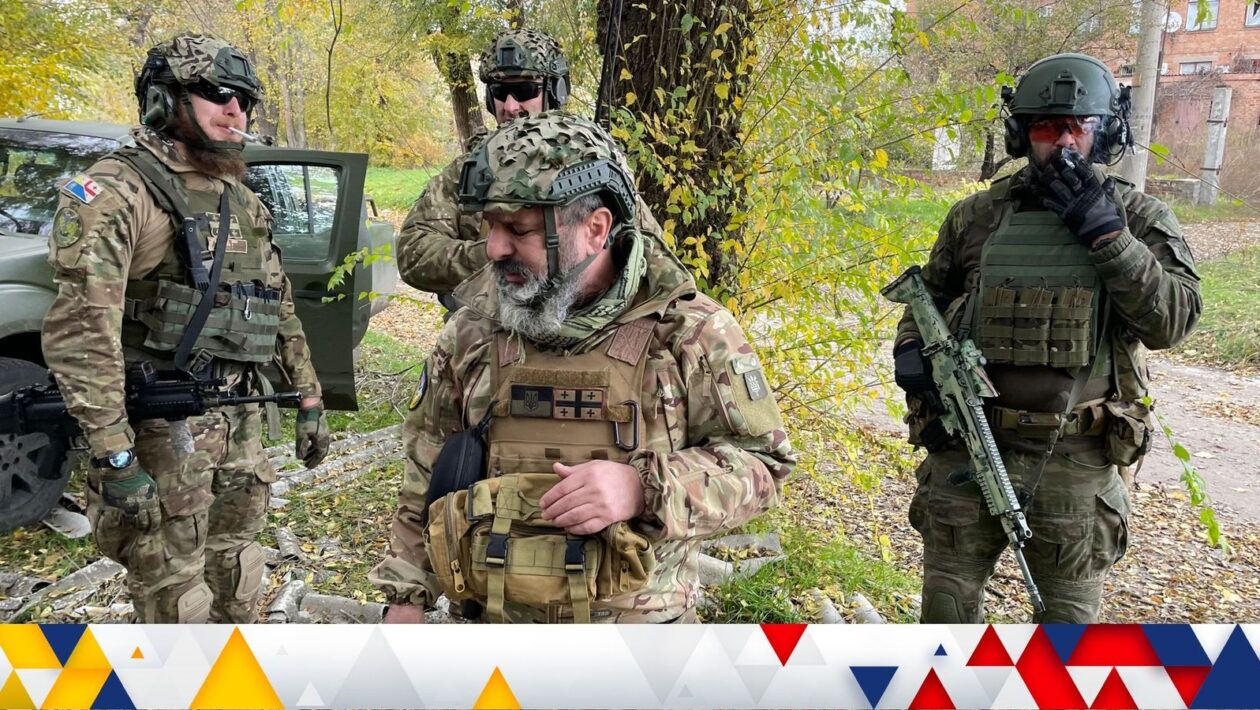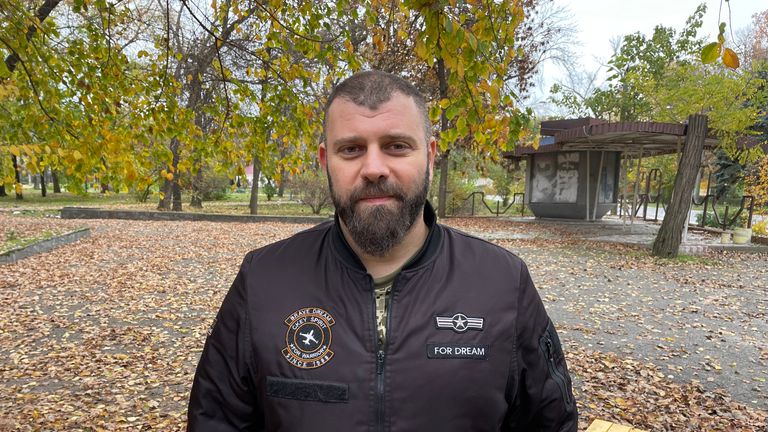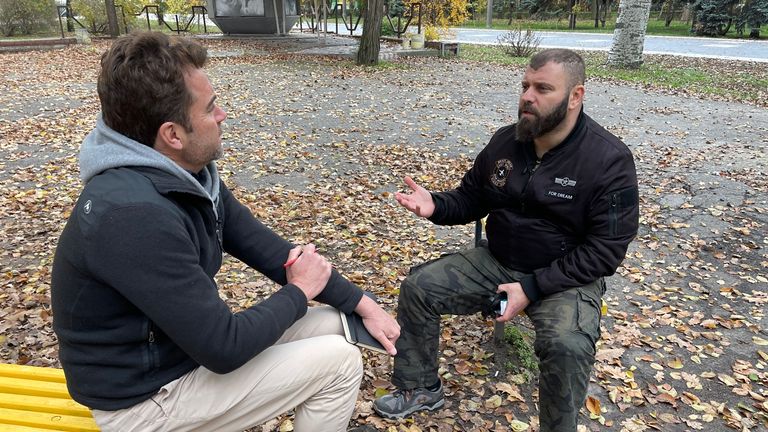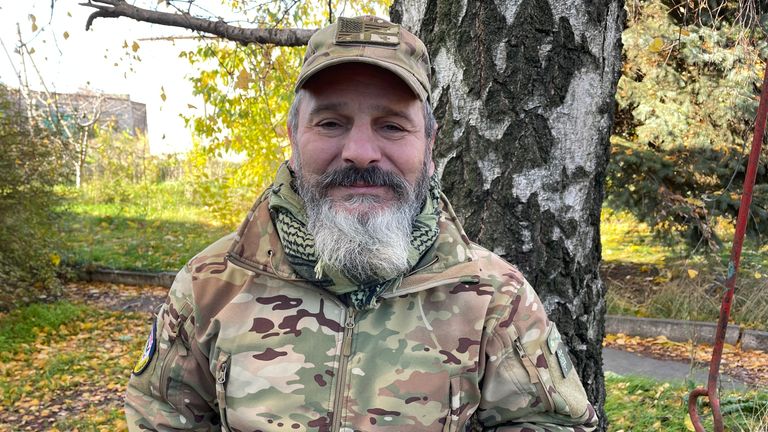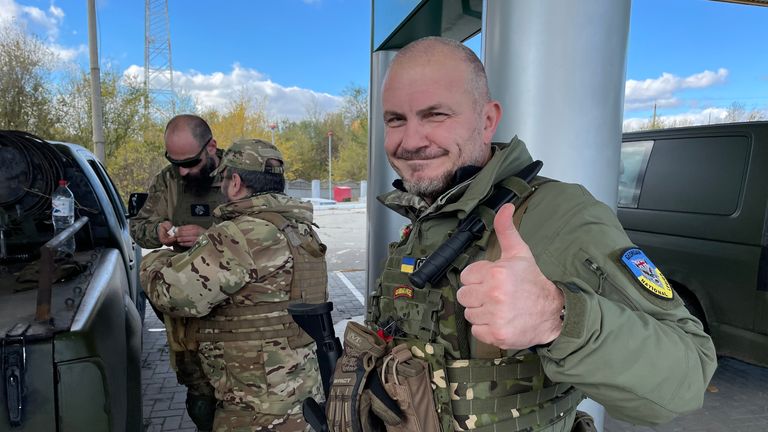[ad_1]
Grunge band Nirvana was booming from a car speaker when we arrived at a nondescript shed-turned-army-base in eastern Ukraine.
We saw a dozen or so men wearing military fatigues, laughing and chatting over the rock music, yet we also sensed the tang of pre-mission tension hanging in the air.
‘Electricity out’ in occupied cities – Ukraine latest
These fighters belong to an outfit called the “Georgian Legion”, a paramilitary unit which fights for Ukraine – and men with guns were about to depart on a mission.
The Legion boasts some 1,000 members, drawn from Georgia in the south Caucusus, as well as a variety of other countries. We were told that there are 50 Britons currently serving in the unit.
Together, they share one overriding aim – the destruction of Vladimir Putin‘s Russia.
“It is the same fight for us, the enemy is the same in Georgia and Ukraine,” said a former Georgian civil servant, turned combatant called Giorgi.
“You could very easily get killed,” I said.
“Yes, killing is not easy for a human, but Russians aren’t human.”
The Georgian Legion has been around since 2014, when 10 officers from Georgia volunteered to fight – and train Ukrainian soldiers – at the beginning of the conflict with Russia.
But this is not the only unit composed of foreigners fighting in Ukraine. An “International Legion” was formed by the Ukrainian government earlier this year, with positions for people with prior military experience. Personnel from 60 countries have signed up.
And foreign nationals are also fighting on the Russian side, with private military company Wagner believed to be doing the recruitment. Combatants from Syria and Afghanistan have been drawn into the war, alongside former servicemen and inmates from Russian prisons.
In an interview with the leader of the Georgian Legion, Mamuka Mamulashvili, I asked whether his men were simply mercenaries, fighting the enemy for a monthly handout.
‘Russia is a terrorist state’
“We’ve been here for eight years now, and we didn’t have a salary for a long time,” he said.
“Some soldiers are on a contract now, like the Ukrainian soldiers, [but] it is not much. It is not about having a salary, it’s about an idea to be free. Civilised people will understand this.”
This view was reiterated by a powerful-looking Georgian called Misha, who heads one of the legion’s artillery units.
He took us on a hit-and-run mortar strike and as we drove to the frontline, he told me why he had signed up.
“We have one enemy, and this enemy occupies 20% of my land. When we have fewer of them here, it means less to kill at home.”
Russian forces invaded Georgia in 2008, at the invitation, they claimed, of separatists from the regions of South Ossetia and Abkhazia. In 2021, the European Court of Human Rights ruled that the Russia was ruling directly in these areas and responsible for serious human rights abuses.
Unsurprisingly, the Georgian Legion’s leader takes a hard-line view on Mr Putin’s expansionist policies and thinks the West needs to find a new way to describe his technique.
“When one man straps a bomb on himself in a shopping mall, he is called a terrorist,” he said. “But when the whole country kills civilians all day long, why can’t we call them terrorists? Russia is a terrorist state, it’s killing civilians in the middle of Europe, and we have to brave enough to say it.”
‘There is no difference between so-called civilians and the government’
Mr Mamulashvili does not draw a line between the Russian state and Russian civilians, blaming them equally for the current crisis. Rooted in the complexities of Georgia’s recent past, his views are startling and arguably harsh.
“Surely you make an allowance for Russian people, many of whom have sought protection in your home country?” I asked.
“There is no difference between so-called civilians and the government, they are the same occupiers, and they act the same when they are tourists in (my) country. Most of the so- called tourists in Georgia are agents of Russian Federation, they may destabilise the situation at any minute.”
The head of the legion sees the war in Ukraine as a life-or-death struggle, a battle for Western ideals like democracy and personal freedom. Negotiation is pointless, he says, with a nation that does not listen.
“I don’t speak diplomatically because I have been fighting for 30 years. I tried to learn the alternative way, but diplomacy doesn’t work with Russia, it becomes senseless. There is not an agreement that they have not broken, because the only language they understand is the bullet.”
[ad_2]

